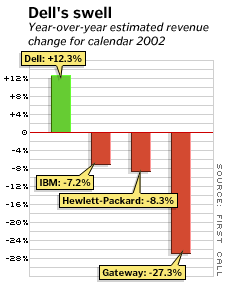NEW YORK (CNN/Money) – Dell Computer raised its revenue guidance for the third quarter Tuesday. And that's great news ... if you own Dell.
But Dell's success is not indicative of a larger trend. The company noted as much in the first line of Tuesday's press release: "Dell is extending its trend of winning new customers and achieving profitable growth even without broad industry recovery." (emphasis added)
| 
| |

| 
| 
|

|
 Jim Schneider, CFO of Dell, talks about raising guidance, challenging environment and competition. Jim Schneider, CFO of Dell, talks about raising guidance, challenging environment and competition.
|
|
Play video
(QuickTime, Real or Windows Media)
|
| 
|

|
|
Dell's low cost structure has enabled it to earn higher profit margins than most other companies in the hardware sector -- Dell said it expects to cut costs by $1 billion this year. And it continues to gain market share because of a stronger customer focus than its competitors. Tuesday's announcement was actually the fourth time this year that Dell increased its revenue outlook.
To that end, Dell is the only major personal computer manufacturer that is expected to post a year-to-year increase in earnings and revenue in calendar 2002. (Apple is the only other PC maker that is expected to generate an increase in sales this year.) Hewlett-Packard still is struggling to integrate its merger with Compaq. Gateway lost money last year and analysts are predicting an even larger loss this year.

During an analysts meeting Wednesday morning, Dell CFO Jim Schneider said that because Dell still has a relatively small presence in areas such as services and storage, the company should be able to continue posting revenue gains even if the overall tech spending environment remains sluggish. Dell is aiming to go after HP in the printer market as well. And there's even room for growth in the maturing PC market, since it is fragmented. Dell may be the second-largest company in the sector, but its market share in the United States is just 15 percent.
Given that Dell has pretty much had success with every new product move it makes, it would seem unwise to bet against the company. There's one problem, though. Wall Street already knows that Dell isn't like other tech companies.
Success priced into the stock
Dell was up 3.4 percent in late afternoon trading , but Hewlett-Packard, Gateway, IBM and Apple all were trading lower. The Nasdaq was down as well. Dell's stock is down just 6.3 percent this year compared with a 38.9 percent decline in the Nasdaq.
As such, Dell's valuation is much higher than its competitors, trading at about 26.6 times earnings estimates for its next fiscal year. HP and IBM trade at just 10.4 and 13.7 times 2003 estimates respectively.
Andy Pratt, manager of the Montgomery U.S. Focus fund, owns Dell shares and is not considering selling since it is the only hardware company that has been able to do well in this market. But he said he wouldn't be buying more of the stock at these levels.
Does Dell deserve a premium? Sure. But considering that Dell's estimated long-term growth rate of 15 percent a year for the next three-to-five years is not that much higher than the projected growth rates of 11 percent for IBM and 12 percent for HP, Dell's valuation looks a bit stretched. HP is trading at a discount to its estimated growth rate while IBM trades at just 1.2 times its growth rate. Dell, however, is valued at 1.8 times its growth rate.
Pratt says that once there are concrete signs of a broad tech turnaround, the shares of beaten down companies like HP and IBM probably will outperform Dell because they have lower valuations. That said, he says it's still premature to call such a rebound.
Others are concerned about the company's declining profit margins as pricing in the PC industry has become more competitive. Even though Dell's net profit margin of 5.8 percent over the past twelve months is tops in the industry, it is below the company's five-year average of 6.7 percent.
One of the main reasons Dell has diversified into areas like servers and storage in the first place is that they are higher-margin businesses. And although Dell has been experiencing solid growth in these areas, it still is primarily a PC company. More than half of its sales in the last quarter came from Dell's desktop division.
"The main reason to own Dell was because of their margins," says Adam Adelman, an analyst with Philippe Investment Management, a money management firm based in New York. "But at some point you have to wonder how much more Dell can squeeze on the expense side and how much of a growth story it can be." Adelman does not own Dell.
Sure, Dell is a much healthier company than most of its competitors and the fact that it probably will show increases in revenue and earnings in such an awful year for technology is incredible. But the market has figured this out.
Or as Dell pitch-kid Steven might say, "Dude, that stock is expensive."

|

